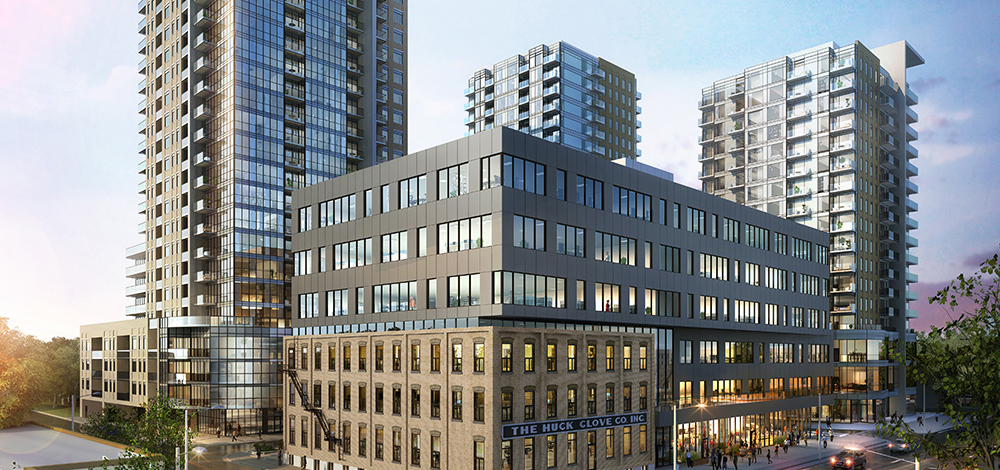Garment Street: New life in Kitchener’s core.
Quarterly Exchange | Q3-2019 Core Redevelopment by Paul Knowles
The downtown cores of Kitchener and Waterloo are being transformed. It’s easy to say this is because of the now-operational Ion Light Rail Transit service, but perhaps the truth is, it’s more because of the vision and commitment of people like Brian Prudham and Don Zehr.

Don Zehr and Brian Prudham with the location of the Garment Street urban village in the background.
Sure, the Region (and other governmental partners) have put a lot of money and faith into the Ion – but that is taxpayer money; the decision-makers don’t actually have “skin in the game”. But Zehr, Prudham, and a significant number of other local developers and builders do have money and reputation on the line – and they are taking the chance in order to do some special things in the heart of the city.
Zehr is really excited about the office building, in which a brand new building will rise beside and above the Huck Glove building… “It is like no other in this area,” he says. “It’s going to be so different.”
Prudham is part of Momentum Developments; Zehr heads the company that bears his name, the Zehr Group. They have joined forces as the Momentum Partnership to build an innovative district in the heart of Kitchener, a development that will include three residential towers, and a breathtaking office complex that incorporates the heritage building that once housed Huck Gloves.
Overall, the area is known as Garment Street – located on Victoria at Bramm, a couple of short blocks from King. It covers 2.6 acres, and when complete, will include 670 condominium apartments, 140,000 square feet of office space, and retail/restaurant services.
Today, the first tower is finished, and all 171 units are occupied. Shovels are not in the ground for the second residential tower, and the third tower and office complex should be underway in the very near future. The entire project should be done – landscaping and all – by spring of 2022. And then, says Prudham, Garment Street will be lined with people sitting on restaurant patios, enjoying the ambience of this brand new community.
And there is no question there will be people, because between 90 and 95 per cent of all three residential tower units – 670 in all – are already sold.
The Momentum Partnership – a branding title, not a new business – was formed because Momentum Developments, already with a strong history of innovative projects in the region, was looking for a partner in the Garment Street development. Don Zehr joined the cause. And the new partners brought in an important third partner– KingSett Capital, described as “Canada’s leading private equity real estate investment firm.”
It’s highly significant that KingSett got involved in Garment Street, says Zehr, because this is the first time the Toronto-based firm has invested as a project partner, in Waterloo Region.
It’s highly significant that KingSett got involved in Garment Street, says Zehr, because this is the first time the Toronto-based firm has invested as a project partner, in Waterloo Region. It’s a mark of the Region’s growing presence on the national scene – and of the credibility of the Momentum Partnership.
Don Zehr has had an office in downtown Kitchener since the late 1980s, and he has had a front-row seat to the changes, both bad and more recently, good. He recalls that in the late 80s, “downtown Kitchener was rocking.”
His office is currently located in a plaza purchased at that time, and “this plaza was full of national brand tenants.” But then came the change. “We saw it go from that stage to full-out decline.”
He credits then-Kitchener mayor Carl Zehr (no relation) with taking action to begin to save the city core, first with luring the University of Waterloo to bring the School of Pharmacy to the Victoria and King area. That was followed by the unexpected success of the Kaufman Lofts, and then the redevelopment of The Tannery, which houses Communitech and other high tech enterprises. Don Zehr says, “The Tannery is when you first saw Toronto people taking note of Kitchener.”
Zehr adds, “You have to give credit to Carl Zehr and city council. That [investing in bringing new institutions and businesses to the city core] wasn’t all that popular of an idea, when they set up that fund.” He compares the criticism to what the Region hears about the Ion.
Ironically, perhaps, as Zehr partners with Prudham in Garment Street, Zehr Group has sold their plaza on King to another developer, a package that includes the former Ratz Bechtel funeral home complex.
A close look at the Garment Street project tells us a lot about what’s happening in the city cores of Waterloo Region.
One key development is that the city is entirely on side with projects like Garment Street. The focus on infilling and brownfield development have meant that city planners are big fans of such projects.
The fact that the Momentum Partnership has made a firm commitment to saving, restoring, and even historically designating the Huck Glove building “really created a mixed-use community, and because of this, the city was very easy to work with.”
“demand for parking is on the decline and, in fact, they’re finding they may have planned for too much parking… “the demand keeps drying up.”
Of course, the municipalities are also benefitting from recently reinstated development charges – there was a holiday from such charges, which has ended, with development charges changing from zero to $20,000 “per door”. Prudham fears that these charges, which could reach levels of $30,000-$35,000 “per door” in residential developments, could stall the current boom. He adds that there is another financial challenge on the horizon: “Rising construction costs have started to outpace the retail rate of condos.”
There is perhaps an advantage here, for the Garment Street project, because construction is carried out by another of Don Zehr’s entities – Zehr Levesque Inc., an award-winning company.
Prudham and Zehr don’t believe that the light rail transit system is the only factor – or even the most important one – in what’s happening in the city cores, but they do think it is significant. Zehr says, “I feel like it’s the bonus.” Prudham adds, “All of a sudden there’s this way to connect.”
Zehr points out “Having a transportation system of this quality, means you move up in stature.” And Prudham admits that the Ion was a significant sales point, and that “we selected our sites based on where the platforms are.”
Both men also believe the coming of all-day, two-way GO trains will be important to the health of the city cores.
This focus on public transit is indeed having an impact on how new developments are configured. Headlines were recently made when one new apartment development in Kitchener – featuring small units – was approved with no parking included. That’s a far cry from only five years ago when .8 parking spaces per unit was a requirement.
Today, says Prudham, demand for parking is on the decline and, in fact, they’re finding they may have planned for too much parking – some residents simply won’t buy. He points to a recent development by Momentum that included .65 spaces for each unit… but in the end, only .5 spaces were required. A lot of people living in the core of the city simply don’t have, or want, cars. Says Prudham, “the demand keeps drying up.”
Instead, he adds, the key is “making sure you’re Uber-ready, with a pick up and drop-off space.”
The project partners understand that the personality of Garment Street may actually change over the years. Today, the residents are from “a younger demographic,” says Prudham, but that “may shift” as retirees seek the convenience of city core accommodations.
Whatever the age of residents, they are going to find a lot of amenities at Garment Street. The community will include a pet run, an outdoor sports park, an outdoor leisure area, a pool, a yoga studio, a gym, an indoor party room, and a lobby that can serve as an informal co-working area. The office building will be similarly “amenity-rich.”
Zehr believes the development will naturally draw retail and restaurant clients for the ground-floor spaces available to them, because when complete, there will be about 1,000 Garment Street residents, another 1,000 people working in the office spaces, and plenty of other neighbours each to hang out on new patios.
The partners in the Momentum Partnership is involved are collaborating on two other projects – the 31-storey “Charlie West” building at Charles and Gaukel Streets, and a factory conversion project in Guelph.
Both Don Zehr and Brian Prudham were born and raised in Waterloo Region, and there is a strong sense of hometown pride evident when the men talk about their work. They have the opportunity to help restore vitality to the Kitchener city core, and they’re determined to make that happen, and soon.
“You have to give credit to Carl Zehr and city council. That [investing in bringing new institutions and businesses to the city core] wasn’t all that popular of an idea, when they set up that fund.”
